Research Proposal: Internal Audit Function & Corporate Governance
VerifiedAdded on 2023/06/12
|23
|5866
|211
Report
AI Summary
This research proposal investigates the relationship between the internal audit function and the development of corporate governance codes, particularly in the context of Libya's Harouge Oil Operations. It aims to examine the efficacies of internal audit in promoting good governance, reviewing its roles in internal control and risk management, and implementing best practices for developing corporate governance codes. The proposal includes a literature review covering the concept of internal audit, corporate governance, relevant theoretical perspectives like agency and stewardship theory, and the role of internal audit in risk management and compliance. The research methodology outlines the research type, approach, techniques, design, sampling, data collection, and analysis procedures. Potential research problems and ethical considerations are also addressed, providing a comprehensive framework for understanding the contribution of internal audit to corporate governance.
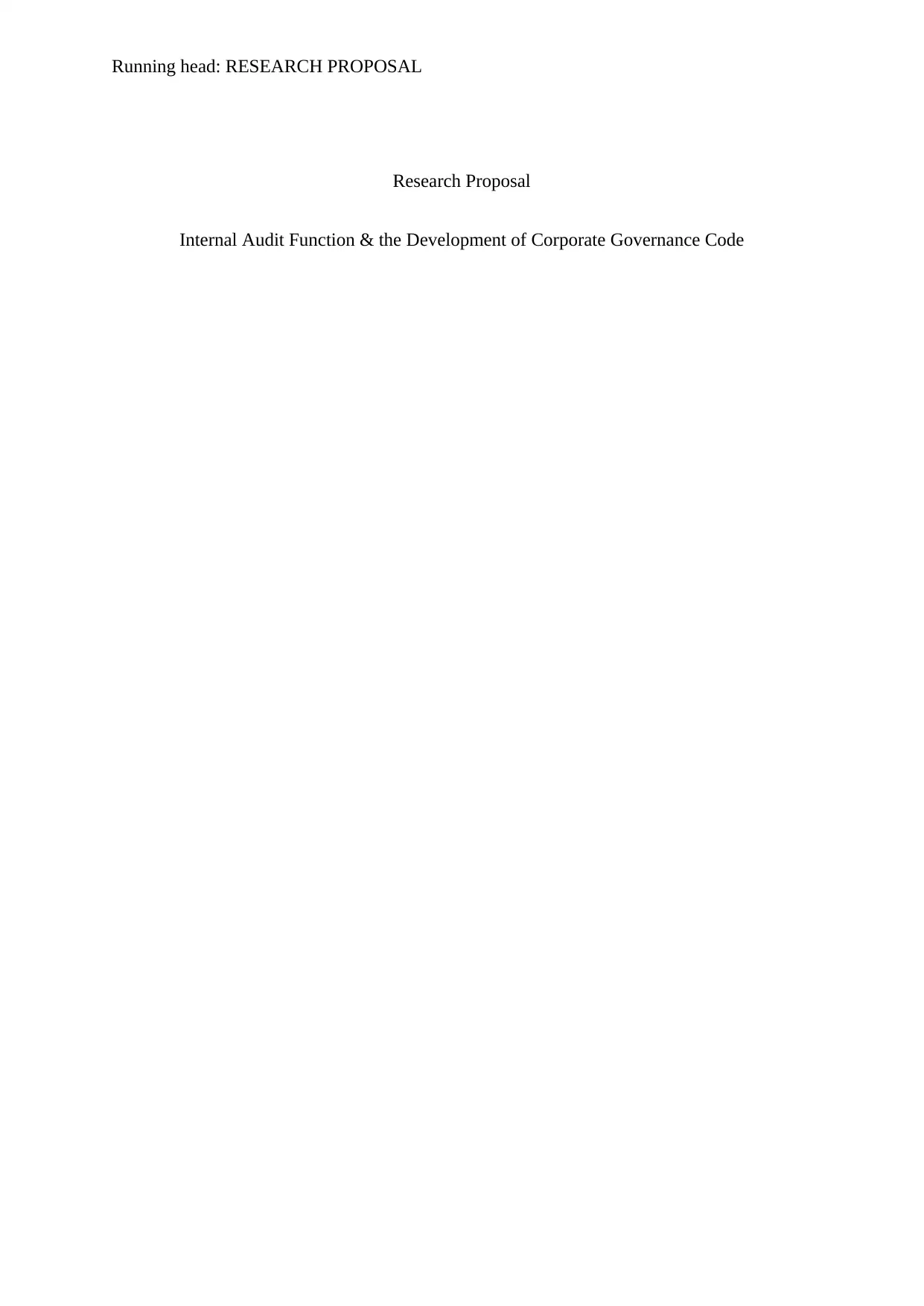
Running head: RESEARCH PROPOSAL
Research Proposal
Internal Audit Function & the Development of Corporate Governance Code
Research Proposal
Internal Audit Function & the Development of Corporate Governance Code
Paraphrase This Document
Need a fresh take? Get an instant paraphrase of this document with our AI Paraphraser
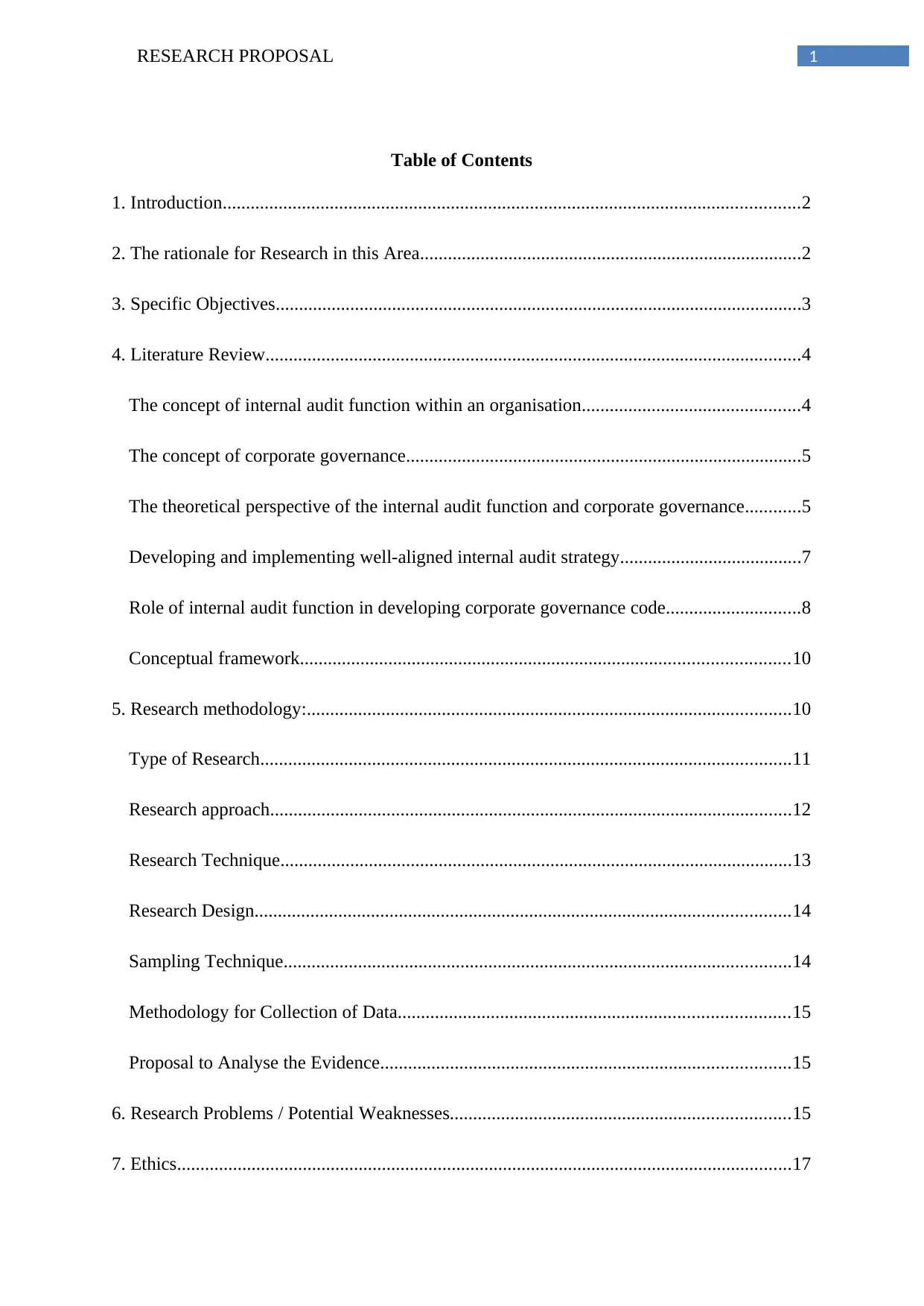
1RESEARCH PROPOSAL
Table of Contents
1. Introduction............................................................................................................................2
2. The rationale for Research in this Area..................................................................................2
3. Specific Objectives.................................................................................................................3
4. Literature Review...................................................................................................................4
The concept of internal audit function within an organisation...............................................4
The concept of corporate governance.....................................................................................5
The theoretical perspective of the internal audit function and corporate governance............5
Developing and implementing well-aligned internal audit strategy.......................................7
Role of internal audit function in developing corporate governance code.............................8
Conceptual framework.........................................................................................................10
5. Research methodology:........................................................................................................10
Type of Research..................................................................................................................11
Research approach................................................................................................................12
Research Technique..............................................................................................................13
Research Design...................................................................................................................14
Sampling Technique.............................................................................................................14
Methodology for Collection of Data....................................................................................15
Proposal to Analyse the Evidence........................................................................................15
6. Research Problems / Potential Weaknesses.........................................................................15
7. Ethics....................................................................................................................................17
Table of Contents
1. Introduction............................................................................................................................2
2. The rationale for Research in this Area..................................................................................2
3. Specific Objectives.................................................................................................................3
4. Literature Review...................................................................................................................4
The concept of internal audit function within an organisation...............................................4
The concept of corporate governance.....................................................................................5
The theoretical perspective of the internal audit function and corporate governance............5
Developing and implementing well-aligned internal audit strategy.......................................7
Role of internal audit function in developing corporate governance code.............................8
Conceptual framework.........................................................................................................10
5. Research methodology:........................................................................................................10
Type of Research..................................................................................................................11
Research approach................................................................................................................12
Research Technique..............................................................................................................13
Research Design...................................................................................................................14
Sampling Technique.............................................................................................................14
Methodology for Collection of Data....................................................................................15
Proposal to Analyse the Evidence........................................................................................15
6. Research Problems / Potential Weaknesses.........................................................................15
7. Ethics....................................................................................................................................17
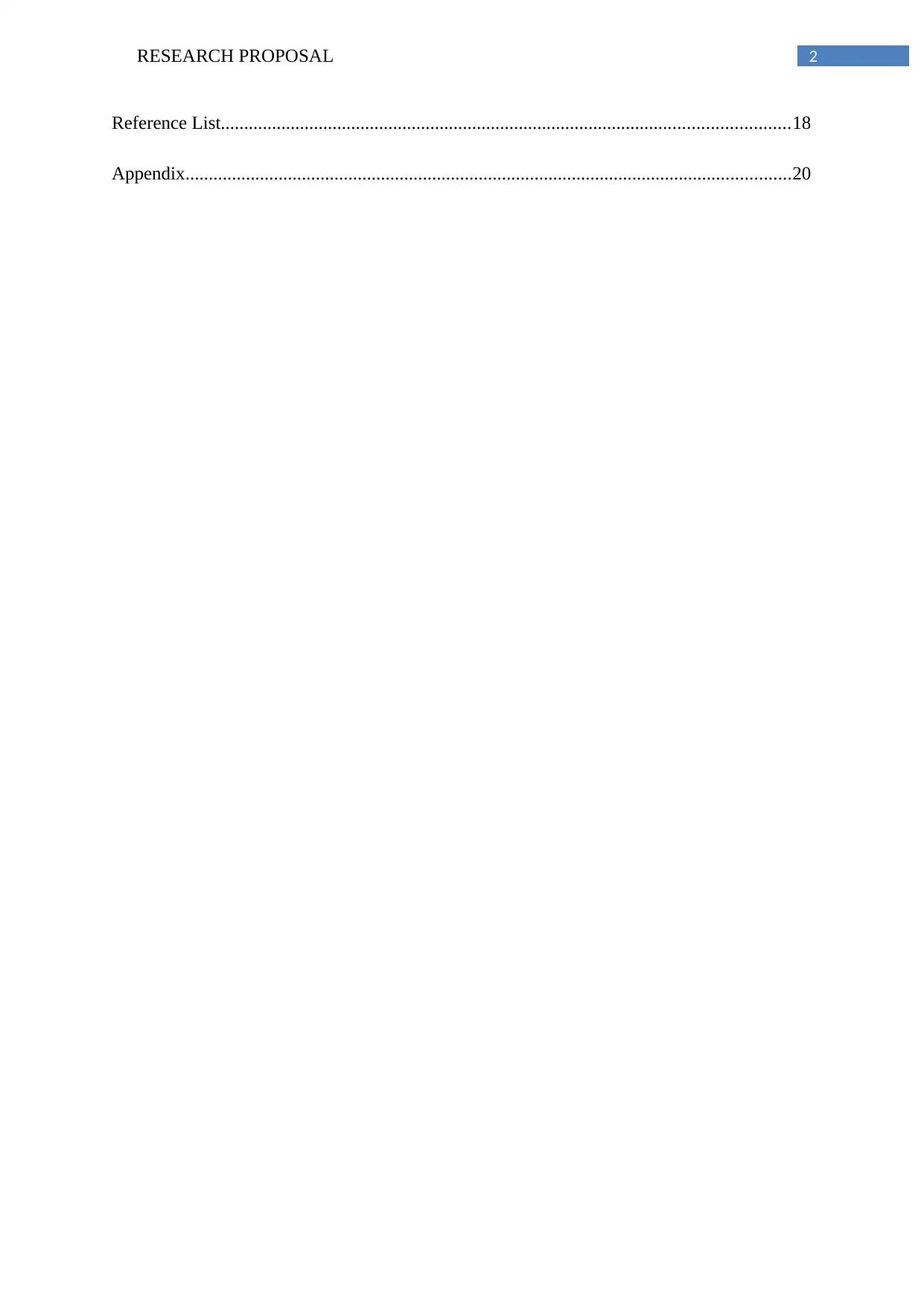
2RESEARCH PROPOSAL
Reference List..........................................................................................................................18
Appendix..................................................................................................................................20
Reference List..........................................................................................................................18
Appendix..................................................................................................................................20
⊘ This is a preview!⊘
Do you want full access?
Subscribe today to unlock all pages.

Trusted by 1+ million students worldwide
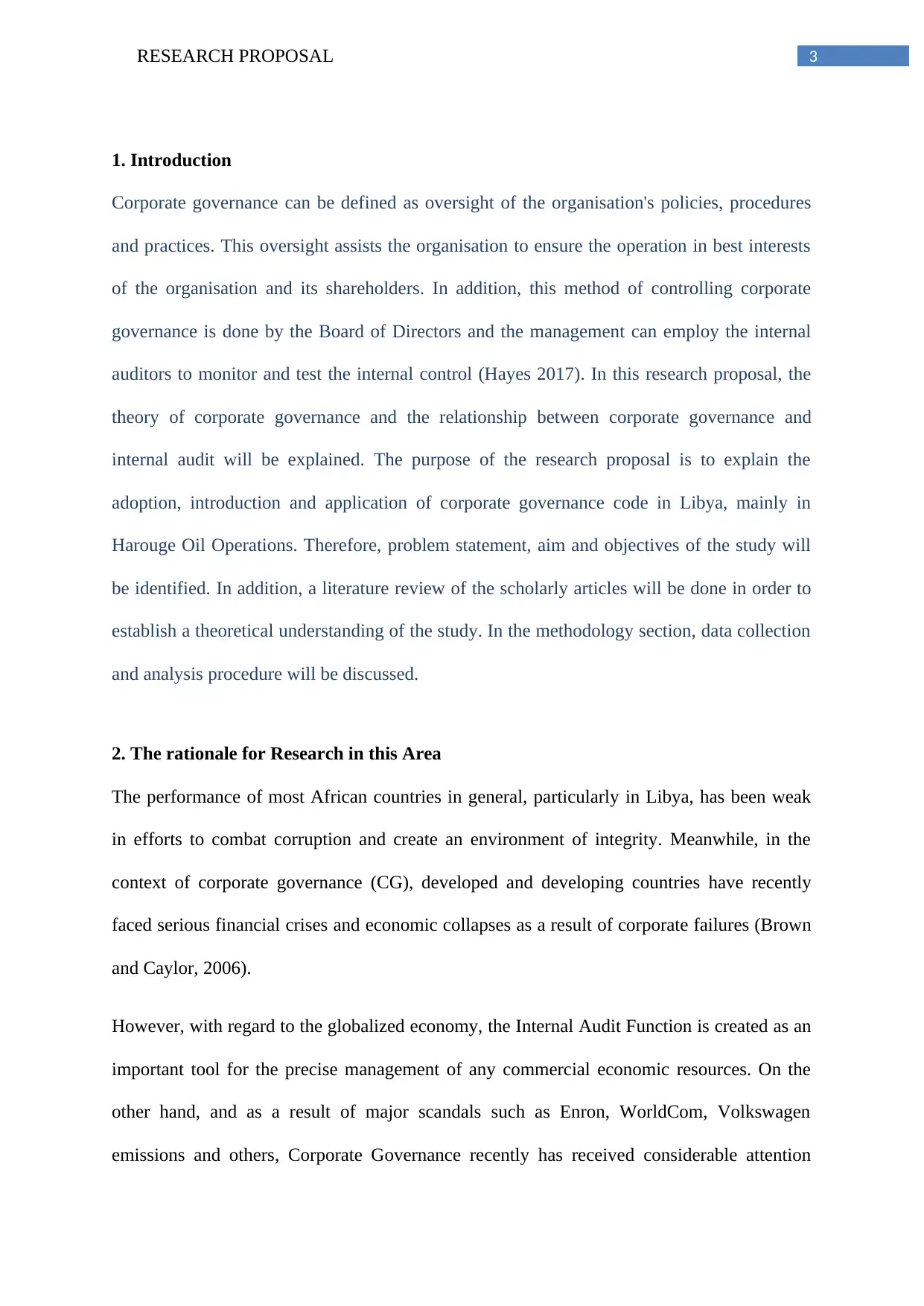
3RESEARCH PROPOSAL
1. Introduction
Corporate governance can be defined as oversight of the organisation's policies, procedures
and practices. This oversight assists the organisation to ensure the operation in best interests
of the organisation and its shareholders. In addition, this method of controlling corporate
governance is done by the Board of Directors and the management can employ the internal
auditors to monitor and test the internal control (Hayes 2017). In this research proposal, the
theory of corporate governance and the relationship between corporate governance and
internal audit will be explained. The purpose of the research proposal is to explain the
adoption, introduction and application of corporate governance code in Libya, mainly in
Harouge Oil Operations. Therefore, problem statement, aim and objectives of the study will
be identified. In addition, a literature review of the scholarly articles will be done in order to
establish a theoretical understanding of the study. In the methodology section, data collection
and analysis procedure will be discussed.
2. The rationale for Research in this Area
The performance of most African countries in general, particularly in Libya, has been weak
in efforts to combat corruption and create an environment of integrity. Meanwhile, in the
context of corporate governance (CG), developed and developing countries have recently
faced serious financial crises and economic collapses as a result of corporate failures (Brown
and Caylor, 2006).
However, with regard to the globalized economy, the Internal Audit Function is created as an
important tool for the precise management of any commercial economic resources. On the
other hand, and as a result of major scandals such as Enron, WorldCom, Volkswagen
emissions and others, Corporate Governance recently has received considerable attention
1. Introduction
Corporate governance can be defined as oversight of the organisation's policies, procedures
and practices. This oversight assists the organisation to ensure the operation in best interests
of the organisation and its shareholders. In addition, this method of controlling corporate
governance is done by the Board of Directors and the management can employ the internal
auditors to monitor and test the internal control (Hayes 2017). In this research proposal, the
theory of corporate governance and the relationship between corporate governance and
internal audit will be explained. The purpose of the research proposal is to explain the
adoption, introduction and application of corporate governance code in Libya, mainly in
Harouge Oil Operations. Therefore, problem statement, aim and objectives of the study will
be identified. In addition, a literature review of the scholarly articles will be done in order to
establish a theoretical understanding of the study. In the methodology section, data collection
and analysis procedure will be discussed.
2. The rationale for Research in this Area
The performance of most African countries in general, particularly in Libya, has been weak
in efforts to combat corruption and create an environment of integrity. Meanwhile, in the
context of corporate governance (CG), developed and developing countries have recently
faced serious financial crises and economic collapses as a result of corporate failures (Brown
and Caylor, 2006).
However, with regard to the globalized economy, the Internal Audit Function is created as an
important tool for the precise management of any commercial economic resources. On the
other hand, and as a result of major scandals such as Enron, WorldCom, Volkswagen
emissions and others, Corporate Governance recently has received considerable attention
Paraphrase This Document
Need a fresh take? Get an instant paraphrase of this document with our AI Paraphraser
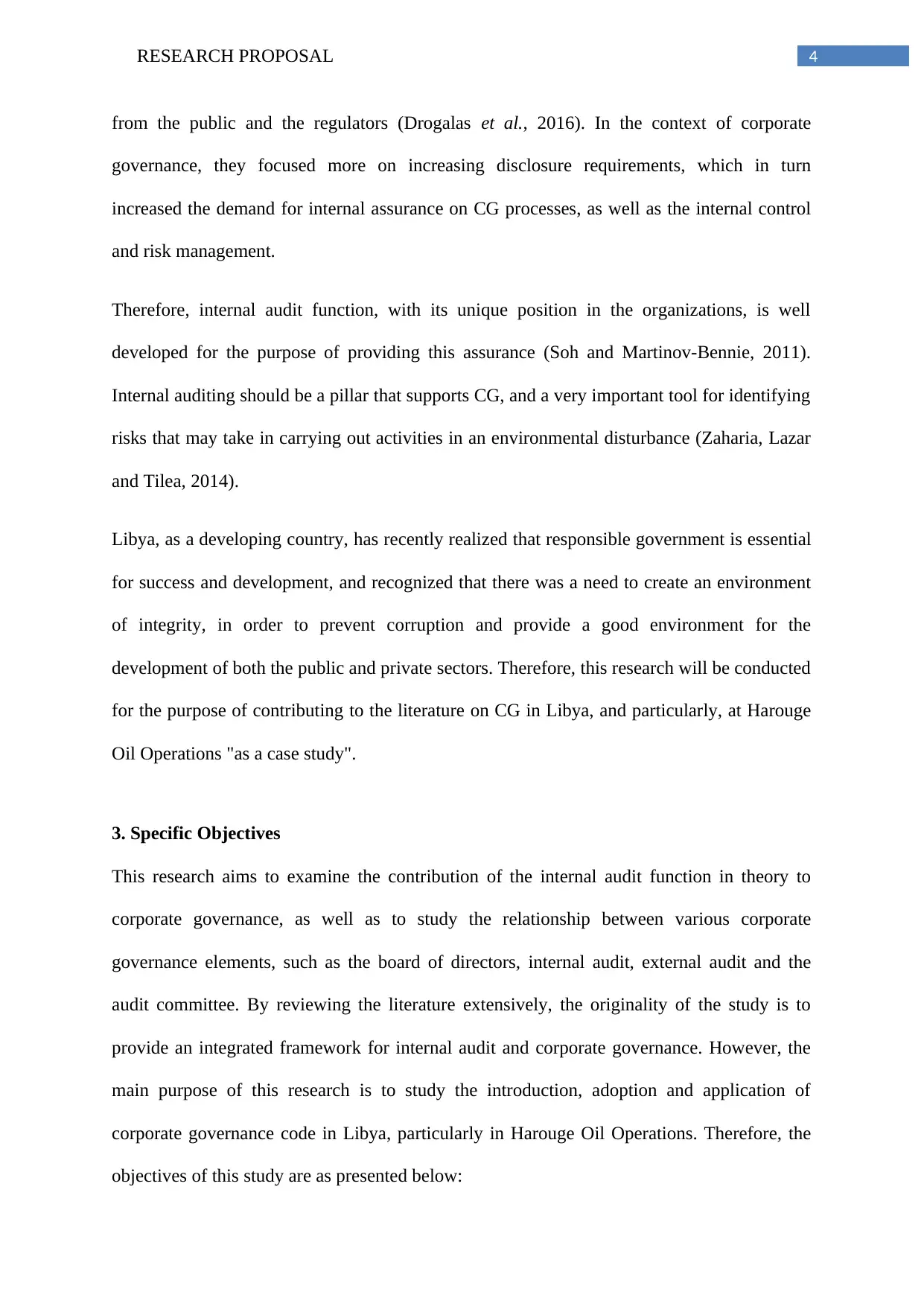
4RESEARCH PROPOSAL
from the public and the regulators (Drogalas et al., 2016). In the context of corporate
governance, they focused more on increasing disclosure requirements, which in turn
increased the demand for internal assurance on CG processes, as well as the internal control
and risk management.
Therefore, internal audit function, with its unique position in the organizations, is well
developed for the purpose of providing this assurance (Soh and Martinov-Bennie, 2011).
Internal auditing should be a pillar that supports CG, and a very important tool for identifying
risks that may take in carrying out activities in an environmental disturbance (Zaharia, Lazar
and Tilea, 2014).
Libya, as a developing country, has recently realized that responsible government is essential
for success and development, and recognized that there was a need to create an environment
of integrity, in order to prevent corruption and provide a good environment for the
development of both the public and private sectors. Therefore, this research will be conducted
for the purpose of contributing to the literature on CG in Libya, and particularly, at Harouge
Oil Operations "as a case study".
3. Specific Objectives
This research aims to examine the contribution of the internal audit function in theory to
corporate governance, as well as to study the relationship between various corporate
governance elements, such as the board of directors, internal audit, external audit and the
audit committee. By reviewing the literature extensively, the originality of the study is to
provide an integrated framework for internal audit and corporate governance. However, the
main purpose of this research is to study the introduction, adoption and application of
corporate governance code in Libya, particularly in Harouge Oil Operations. Therefore, the
objectives of this study are as presented below:
from the public and the regulators (Drogalas et al., 2016). In the context of corporate
governance, they focused more on increasing disclosure requirements, which in turn
increased the demand for internal assurance on CG processes, as well as the internal control
and risk management.
Therefore, internal audit function, with its unique position in the organizations, is well
developed for the purpose of providing this assurance (Soh and Martinov-Bennie, 2011).
Internal auditing should be a pillar that supports CG, and a very important tool for identifying
risks that may take in carrying out activities in an environmental disturbance (Zaharia, Lazar
and Tilea, 2014).
Libya, as a developing country, has recently realized that responsible government is essential
for success and development, and recognized that there was a need to create an environment
of integrity, in order to prevent corruption and provide a good environment for the
development of both the public and private sectors. Therefore, this research will be conducted
for the purpose of contributing to the literature on CG in Libya, and particularly, at Harouge
Oil Operations "as a case study".
3. Specific Objectives
This research aims to examine the contribution of the internal audit function in theory to
corporate governance, as well as to study the relationship between various corporate
governance elements, such as the board of directors, internal audit, external audit and the
audit committee. By reviewing the literature extensively, the originality of the study is to
provide an integrated framework for internal audit and corporate governance. However, the
main purpose of this research is to study the introduction, adoption and application of
corporate governance code in Libya, particularly in Harouge Oil Operations. Therefore, the
objectives of this study are as presented below:
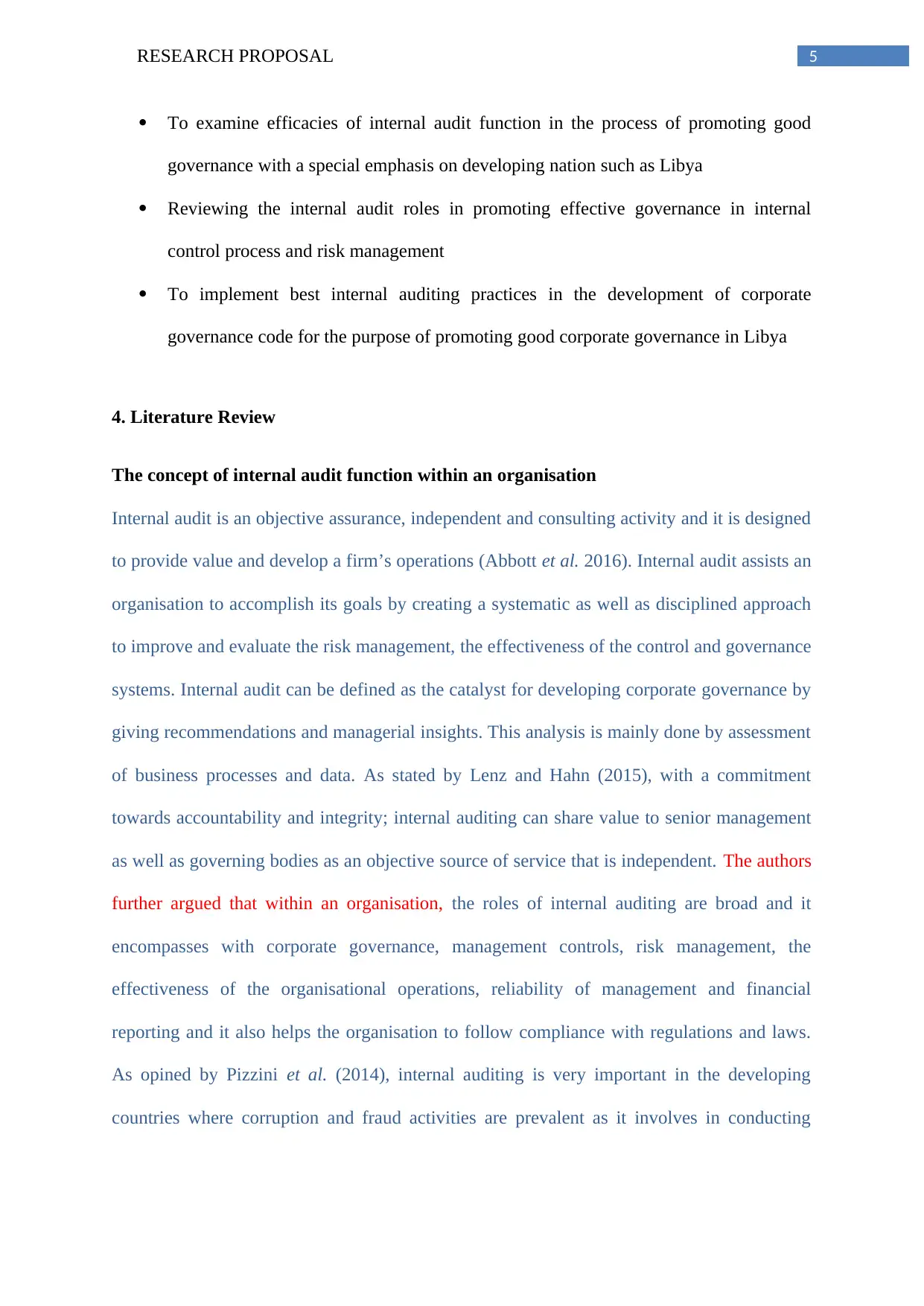
5RESEARCH PROPOSAL
To examine efficacies of internal audit function in the process of promoting good
governance with a special emphasis on developing nation such as Libya
Reviewing the internal audit roles in promoting effective governance in internal
control process and risk management
To implement best internal auditing practices in the development of corporate
governance code for the purpose of promoting good corporate governance in Libya
4. Literature Review
The concept of internal audit function within an organisation
Internal audit is an objective assurance, independent and consulting activity and it is designed
to provide value and develop a firm’s operations (Abbott et al. 2016). Internal audit assists an
organisation to accomplish its goals by creating a systematic as well as disciplined approach
to improve and evaluate the risk management, the effectiveness of the control and governance
systems. Internal audit can be defined as the catalyst for developing corporate governance by
giving recommendations and managerial insights. This analysis is mainly done by assessment
of business processes and data. As stated by Lenz and Hahn (2015), with a commitment
towards accountability and integrity; internal auditing can share value to senior management
as well as governing bodies as an objective source of service that is independent. The authors
further argued that within an organisation, the roles of internal auditing are broad and it
encompasses with corporate governance, management controls, risk management, the
effectiveness of the organisational operations, reliability of management and financial
reporting and it also helps the organisation to follow compliance with regulations and laws.
As opined by Pizzini et al. (2014), internal auditing is very important in the developing
countries where corruption and fraud activities are prevalent as it involves in conducting
To examine efficacies of internal audit function in the process of promoting good
governance with a special emphasis on developing nation such as Libya
Reviewing the internal audit roles in promoting effective governance in internal
control process and risk management
To implement best internal auditing practices in the development of corporate
governance code for the purpose of promoting good corporate governance in Libya
4. Literature Review
The concept of internal audit function within an organisation
Internal audit is an objective assurance, independent and consulting activity and it is designed
to provide value and develop a firm’s operations (Abbott et al. 2016). Internal audit assists an
organisation to accomplish its goals by creating a systematic as well as disciplined approach
to improve and evaluate the risk management, the effectiveness of the control and governance
systems. Internal audit can be defined as the catalyst for developing corporate governance by
giving recommendations and managerial insights. This analysis is mainly done by assessment
of business processes and data. As stated by Lenz and Hahn (2015), with a commitment
towards accountability and integrity; internal auditing can share value to senior management
as well as governing bodies as an objective source of service that is independent. The authors
further argued that within an organisation, the roles of internal auditing are broad and it
encompasses with corporate governance, management controls, risk management, the
effectiveness of the organisational operations, reliability of management and financial
reporting and it also helps the organisation to follow compliance with regulations and laws.
As opined by Pizzini et al. (2014), internal auditing is very important in the developing
countries where corruption and fraud activities are prevalent as it involves in conducting
⊘ This is a preview!⊘
Do you want full access?
Subscribe today to unlock all pages.

Trusted by 1+ million students worldwide
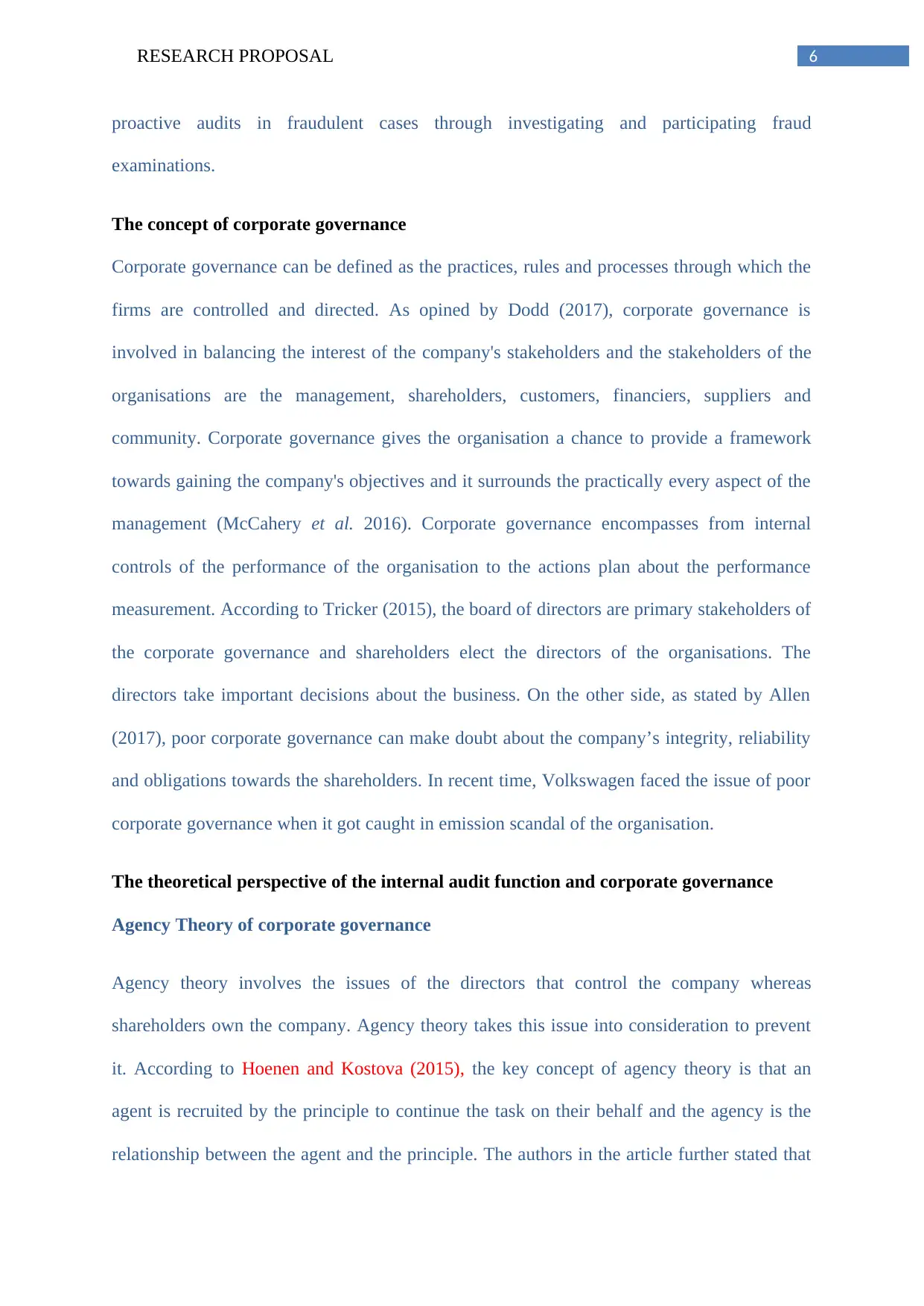
6RESEARCH PROPOSAL
proactive audits in fraudulent cases through investigating and participating fraud
examinations.
The concept of corporate governance
Corporate governance can be defined as the practices, rules and processes through which the
firms are controlled and directed. As opined by Dodd (2017), corporate governance is
involved in balancing the interest of the company's stakeholders and the stakeholders of the
organisations are the management, shareholders, customers, financiers, suppliers and
community. Corporate governance gives the organisation a chance to provide a framework
towards gaining the company's objectives and it surrounds the practically every aspect of the
management (McCahery et al. 2016). Corporate governance encompasses from internal
controls of the performance of the organisation to the actions plan about the performance
measurement. According to Tricker (2015), the board of directors are primary stakeholders of
the corporate governance and shareholders elect the directors of the organisations. The
directors take important decisions about the business. On the other side, as stated by Allen
(2017), poor corporate governance can make doubt about the company’s integrity, reliability
and obligations towards the shareholders. In recent time, Volkswagen faced the issue of poor
corporate governance when it got caught in emission scandal of the organisation.
The theoretical perspective of the internal audit function and corporate governance
Agency Theory of corporate governance
Agency theory involves the issues of the directors that control the company whereas
shareholders own the company. Agency theory takes this issue into consideration to prevent
it. According to Hoenen and Kostova (2015), the key concept of agency theory is that an
agent is recruited by the principle to continue the task on their behalf and the agency is the
relationship between the agent and the principle. The authors in the article further stated that
proactive audits in fraudulent cases through investigating and participating fraud
examinations.
The concept of corporate governance
Corporate governance can be defined as the practices, rules and processes through which the
firms are controlled and directed. As opined by Dodd (2017), corporate governance is
involved in balancing the interest of the company's stakeholders and the stakeholders of the
organisations are the management, shareholders, customers, financiers, suppliers and
community. Corporate governance gives the organisation a chance to provide a framework
towards gaining the company's objectives and it surrounds the practically every aspect of the
management (McCahery et al. 2016). Corporate governance encompasses from internal
controls of the performance of the organisation to the actions plan about the performance
measurement. According to Tricker (2015), the board of directors are primary stakeholders of
the corporate governance and shareholders elect the directors of the organisations. The
directors take important decisions about the business. On the other side, as stated by Allen
(2017), poor corporate governance can make doubt about the company’s integrity, reliability
and obligations towards the shareholders. In recent time, Volkswagen faced the issue of poor
corporate governance when it got caught in emission scandal of the organisation.
The theoretical perspective of the internal audit function and corporate governance
Agency Theory of corporate governance
Agency theory involves the issues of the directors that control the company whereas
shareholders own the company. Agency theory takes this issue into consideration to prevent
it. According to Hoenen and Kostova (2015), the key concept of agency theory is that an
agent is recruited by the principle to continue the task on their behalf and the agency is the
relationship between the agent and the principle. The authors in the article further stated that
Paraphrase This Document
Need a fresh take? Get an instant paraphrase of this document with our AI Paraphraser
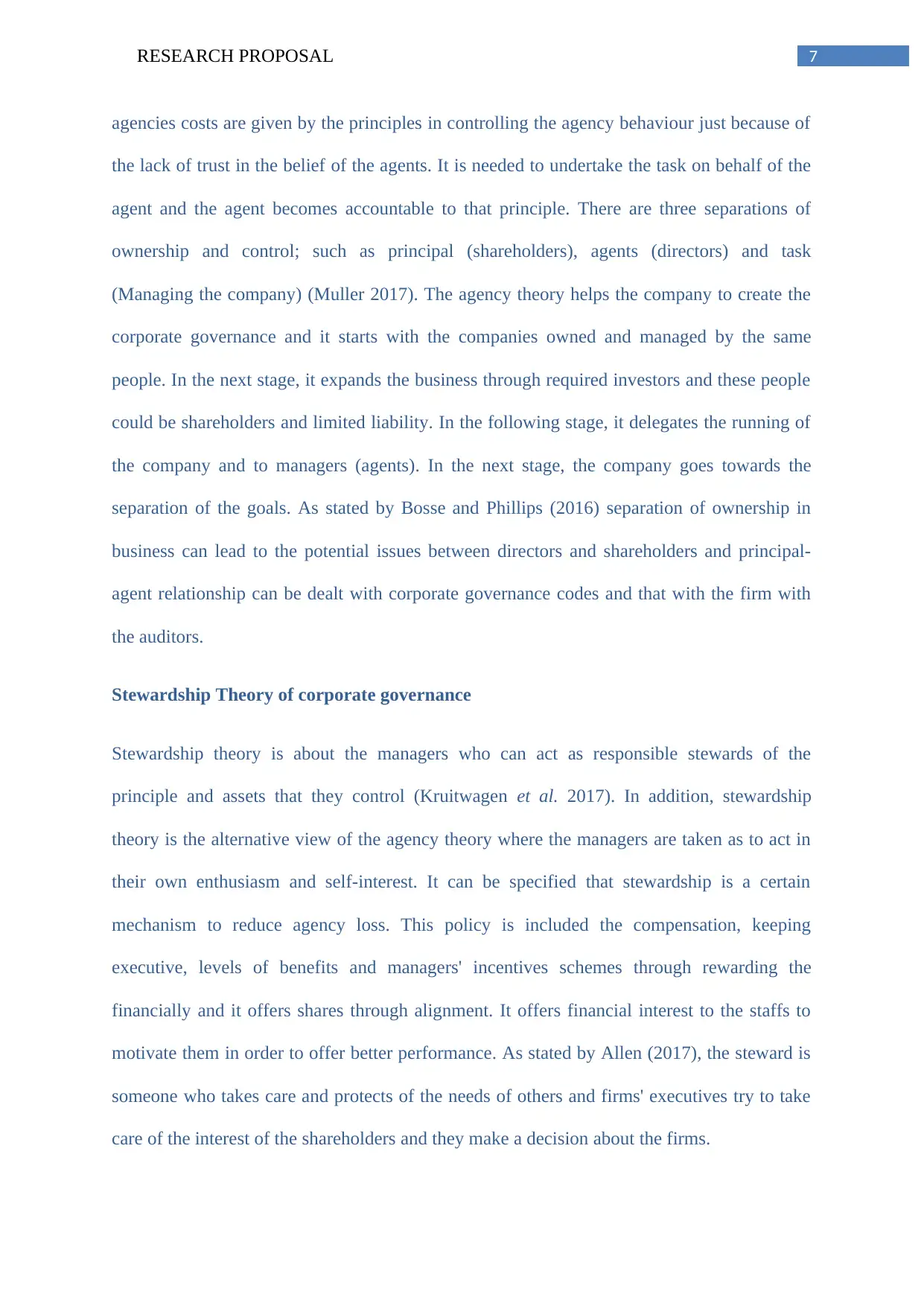
7RESEARCH PROPOSAL
agencies costs are given by the principles in controlling the agency behaviour just because of
the lack of trust in the belief of the agents. It is needed to undertake the task on behalf of the
agent and the agent becomes accountable to that principle. There are three separations of
ownership and control; such as principal (shareholders), agents (directors) and task
(Managing the company) (Muller 2017). The agency theory helps the company to create the
corporate governance and it starts with the companies owned and managed by the same
people. In the next stage, it expands the business through required investors and these people
could be shareholders and limited liability. In the following stage, it delegates the running of
the company and to managers (agents). In the next stage, the company goes towards the
separation of the goals. As stated by Bosse and Phillips (2016) separation of ownership in
business can lead to the potential issues between directors and shareholders and principal-
agent relationship can be dealt with corporate governance codes and that with the firm with
the auditors.
Stewardship Theory of corporate governance
Stewardship theory is about the managers who can act as responsible stewards of the
principle and assets that they control (Kruitwagen et al. 2017). In addition, stewardship
theory is the alternative view of the agency theory where the managers are taken as to act in
their own enthusiasm and self-interest. It can be specified that stewardship is a certain
mechanism to reduce agency loss. This policy is included the compensation, keeping
executive, levels of benefits and managers' incentives schemes through rewarding the
financially and it offers shares through alignment. It offers financial interest to the staffs to
motivate them in order to offer better performance. As stated by Allen (2017), the steward is
someone who takes care and protects of the needs of others and firms' executives try to take
care of the interest of the shareholders and they make a decision about the firms.
agencies costs are given by the principles in controlling the agency behaviour just because of
the lack of trust in the belief of the agents. It is needed to undertake the task on behalf of the
agent and the agent becomes accountable to that principle. There are three separations of
ownership and control; such as principal (shareholders), agents (directors) and task
(Managing the company) (Muller 2017). The agency theory helps the company to create the
corporate governance and it starts with the companies owned and managed by the same
people. In the next stage, it expands the business through required investors and these people
could be shareholders and limited liability. In the following stage, it delegates the running of
the company and to managers (agents). In the next stage, the company goes towards the
separation of the goals. As stated by Bosse and Phillips (2016) separation of ownership in
business can lead to the potential issues between directors and shareholders and principal-
agent relationship can be dealt with corporate governance codes and that with the firm with
the auditors.
Stewardship Theory of corporate governance
Stewardship theory is about the managers who can act as responsible stewards of the
principle and assets that they control (Kruitwagen et al. 2017). In addition, stewardship
theory is the alternative view of the agency theory where the managers are taken as to act in
their own enthusiasm and self-interest. It can be specified that stewardship is a certain
mechanism to reduce agency loss. This policy is included the compensation, keeping
executive, levels of benefits and managers' incentives schemes through rewarding the
financially and it offers shares through alignment. It offers financial interest to the staffs to
motivate them in order to offer better performance. As stated by Allen (2017), the steward is
someone who takes care and protects of the needs of others and firms' executives try to take
care of the interest of the shareholders and they make a decision about the firms.
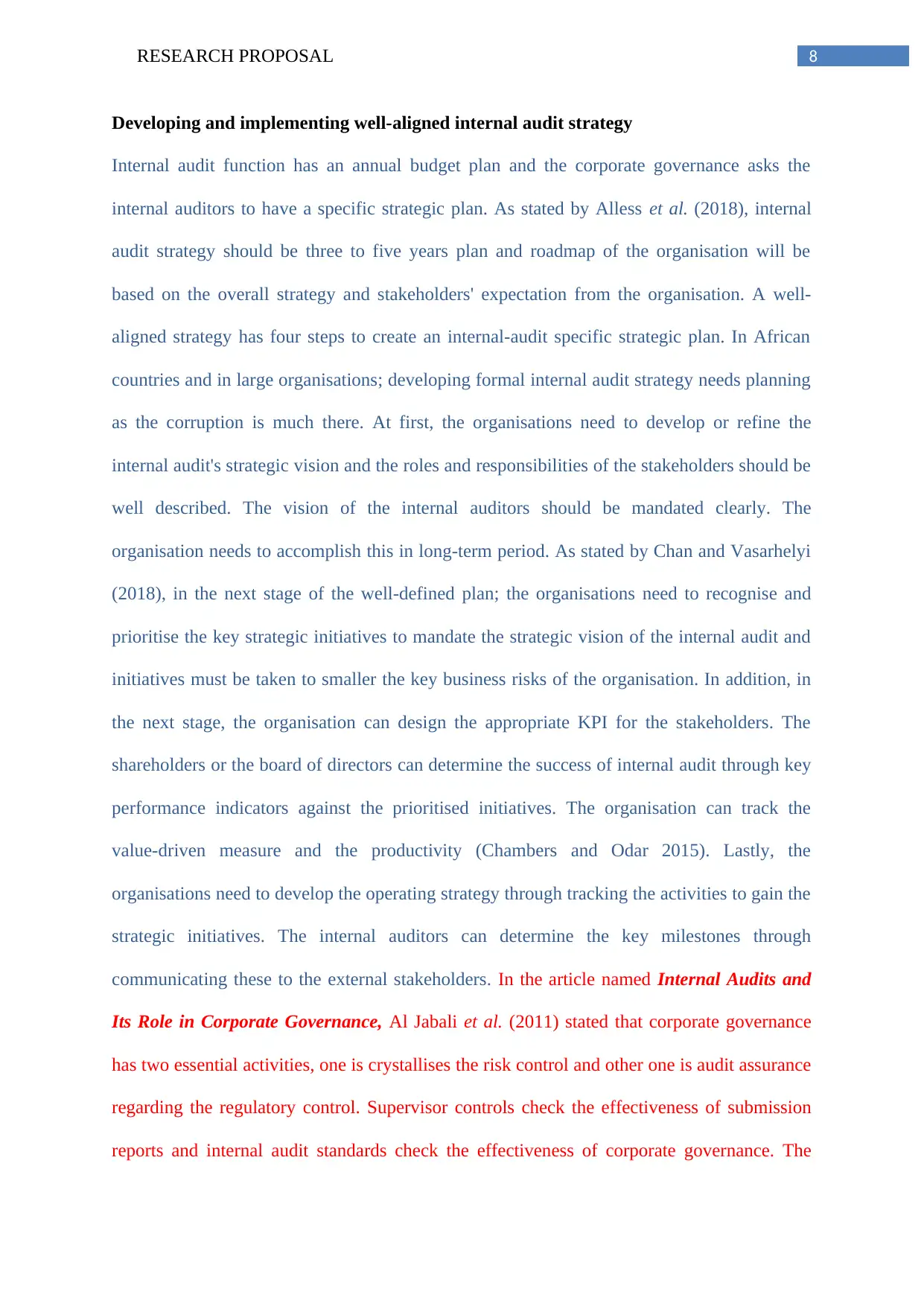
8RESEARCH PROPOSAL
Developing and implementing well-aligned internal audit strategy
Internal audit function has an annual budget plan and the corporate governance asks the
internal auditors to have a specific strategic plan. As stated by Alless et al. (2018), internal
audit strategy should be three to five years plan and roadmap of the organisation will be
based on the overall strategy and stakeholders' expectation from the organisation. A well-
aligned strategy has four steps to create an internal-audit specific strategic plan. In African
countries and in large organisations; developing formal internal audit strategy needs planning
as the corruption is much there. At first, the organisations need to develop or refine the
internal audit's strategic vision and the roles and responsibilities of the stakeholders should be
well described. The vision of the internal auditors should be mandated clearly. The
organisation needs to accomplish this in long-term period. As stated by Chan and Vasarhelyi
(2018), in the next stage of the well-defined plan; the organisations need to recognise and
prioritise the key strategic initiatives to mandate the strategic vision of the internal audit and
initiatives must be taken to smaller the key business risks of the organisation. In addition, in
the next stage, the organisation can design the appropriate KPI for the stakeholders. The
shareholders or the board of directors can determine the success of internal audit through key
performance indicators against the prioritised initiatives. The organisation can track the
value-driven measure and the productivity (Chambers and Odar 2015). Lastly, the
organisations need to develop the operating strategy through tracking the activities to gain the
strategic initiatives. The internal auditors can determine the key milestones through
communicating these to the external stakeholders. In the article named Internal Audits and
Its Role in Corporate Governance, Al Jabali et al. (2011) stated that corporate governance
has two essential activities, one is crystallises the risk control and other one is audit assurance
regarding the regulatory control. Supervisor controls check the effectiveness of submission
reports and internal audit standards check the effectiveness of corporate governance. The
Developing and implementing well-aligned internal audit strategy
Internal audit function has an annual budget plan and the corporate governance asks the
internal auditors to have a specific strategic plan. As stated by Alless et al. (2018), internal
audit strategy should be three to five years plan and roadmap of the organisation will be
based on the overall strategy and stakeholders' expectation from the organisation. A well-
aligned strategy has four steps to create an internal-audit specific strategic plan. In African
countries and in large organisations; developing formal internal audit strategy needs planning
as the corruption is much there. At first, the organisations need to develop or refine the
internal audit's strategic vision and the roles and responsibilities of the stakeholders should be
well described. The vision of the internal auditors should be mandated clearly. The
organisation needs to accomplish this in long-term period. As stated by Chan and Vasarhelyi
(2018), in the next stage of the well-defined plan; the organisations need to recognise and
prioritise the key strategic initiatives to mandate the strategic vision of the internal audit and
initiatives must be taken to smaller the key business risks of the organisation. In addition, in
the next stage, the organisation can design the appropriate KPI for the stakeholders. The
shareholders or the board of directors can determine the success of internal audit through key
performance indicators against the prioritised initiatives. The organisation can track the
value-driven measure and the productivity (Chambers and Odar 2015). Lastly, the
organisations need to develop the operating strategy through tracking the activities to gain the
strategic initiatives. The internal auditors can determine the key milestones through
communicating these to the external stakeholders. In the article named Internal Audits and
Its Role in Corporate Governance, Al Jabali et al. (2011) stated that corporate governance
has two essential activities, one is crystallises the risk control and other one is audit assurance
regarding the regulatory control. Supervisor controls check the effectiveness of submission
reports and internal audit standards check the effectiveness of corporate governance. The
⊘ This is a preview!⊘
Do you want full access?
Subscribe today to unlock all pages.

Trusted by 1+ million students worldwide
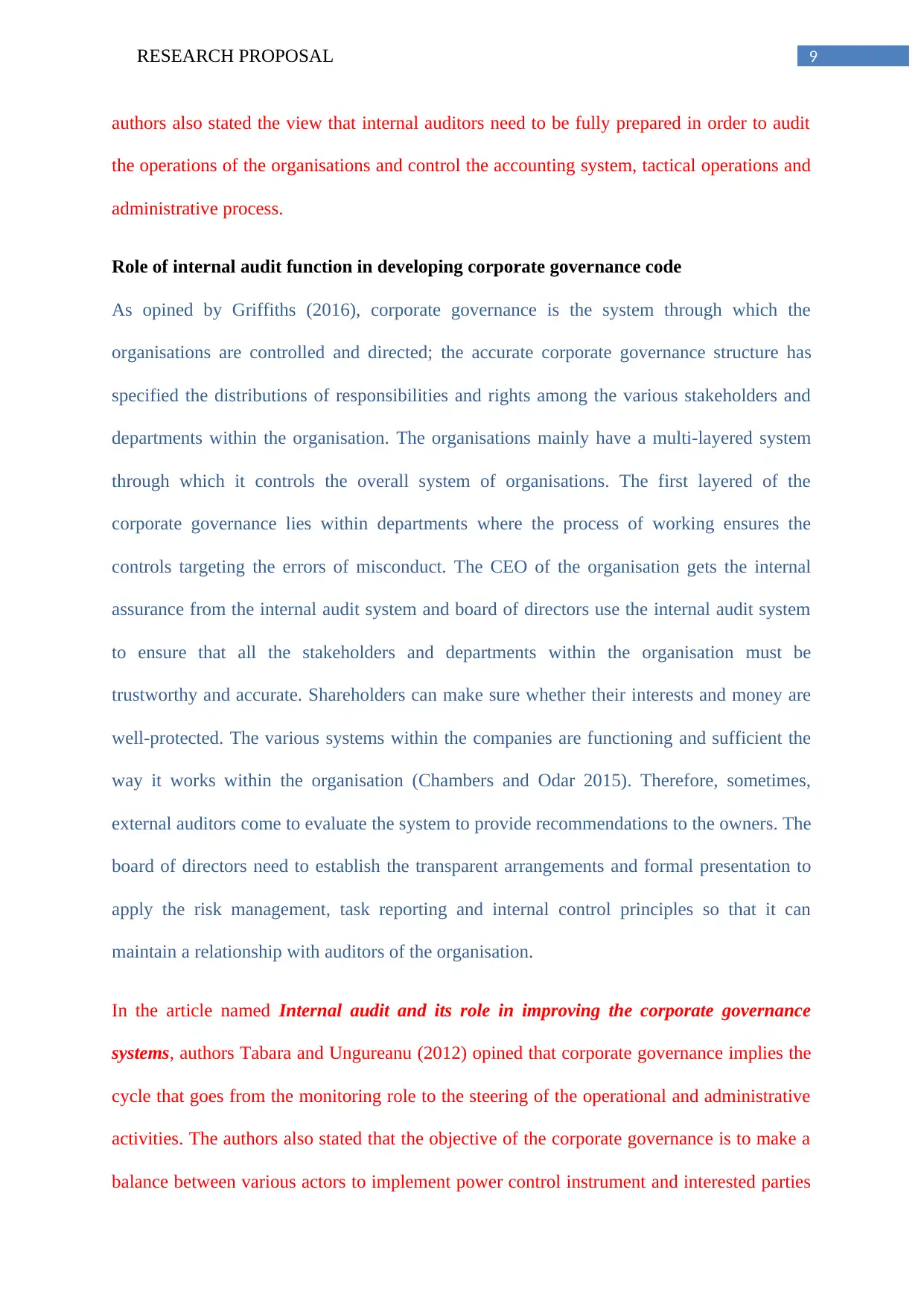
9RESEARCH PROPOSAL
authors also stated the view that internal auditors need to be fully prepared in order to audit
the operations of the organisations and control the accounting system, tactical operations and
administrative process.
Role of internal audit function in developing corporate governance code
As opined by Griffiths (2016), corporate governance is the system through which the
organisations are controlled and directed; the accurate corporate governance structure has
specified the distributions of responsibilities and rights among the various stakeholders and
departments within the organisation. The organisations mainly have a multi-layered system
through which it controls the overall system of organisations. The first layered of the
corporate governance lies within departments where the process of working ensures the
controls targeting the errors of misconduct. The CEO of the organisation gets the internal
assurance from the internal audit system and board of directors use the internal audit system
to ensure that all the stakeholders and departments within the organisation must be
trustworthy and accurate. Shareholders can make sure whether their interests and money are
well-protected. The various systems within the companies are functioning and sufficient the
way it works within the organisation (Chambers and Odar 2015). Therefore, sometimes,
external auditors come to evaluate the system to provide recommendations to the owners. The
board of directors need to establish the transparent arrangements and formal presentation to
apply the risk management, task reporting and internal control principles so that it can
maintain a relationship with auditors of the organisation.
In the article named Internal audit and its role in improving the corporate governance
systems, authors Tabara and Ungureanu (2012) opined that corporate governance implies the
cycle that goes from the monitoring role to the steering of the operational and administrative
activities. The authors also stated that the objective of the corporate governance is to make a
balance between various actors to implement power control instrument and interested parties
authors also stated the view that internal auditors need to be fully prepared in order to audit
the operations of the organisations and control the accounting system, tactical operations and
administrative process.
Role of internal audit function in developing corporate governance code
As opined by Griffiths (2016), corporate governance is the system through which the
organisations are controlled and directed; the accurate corporate governance structure has
specified the distributions of responsibilities and rights among the various stakeholders and
departments within the organisation. The organisations mainly have a multi-layered system
through which it controls the overall system of organisations. The first layered of the
corporate governance lies within departments where the process of working ensures the
controls targeting the errors of misconduct. The CEO of the organisation gets the internal
assurance from the internal audit system and board of directors use the internal audit system
to ensure that all the stakeholders and departments within the organisation must be
trustworthy and accurate. Shareholders can make sure whether their interests and money are
well-protected. The various systems within the companies are functioning and sufficient the
way it works within the organisation (Chambers and Odar 2015). Therefore, sometimes,
external auditors come to evaluate the system to provide recommendations to the owners. The
board of directors need to establish the transparent arrangements and formal presentation to
apply the risk management, task reporting and internal control principles so that it can
maintain a relationship with auditors of the organisation.
In the article named Internal audit and its role in improving the corporate governance
systems, authors Tabara and Ungureanu (2012) opined that corporate governance implies the
cycle that goes from the monitoring role to the steering of the operational and administrative
activities. The authors also stated that the objective of the corporate governance is to make a
balance between various actors to implement power control instrument and interested parties
Paraphrase This Document
Need a fresh take? Get an instant paraphrase of this document with our AI Paraphraser
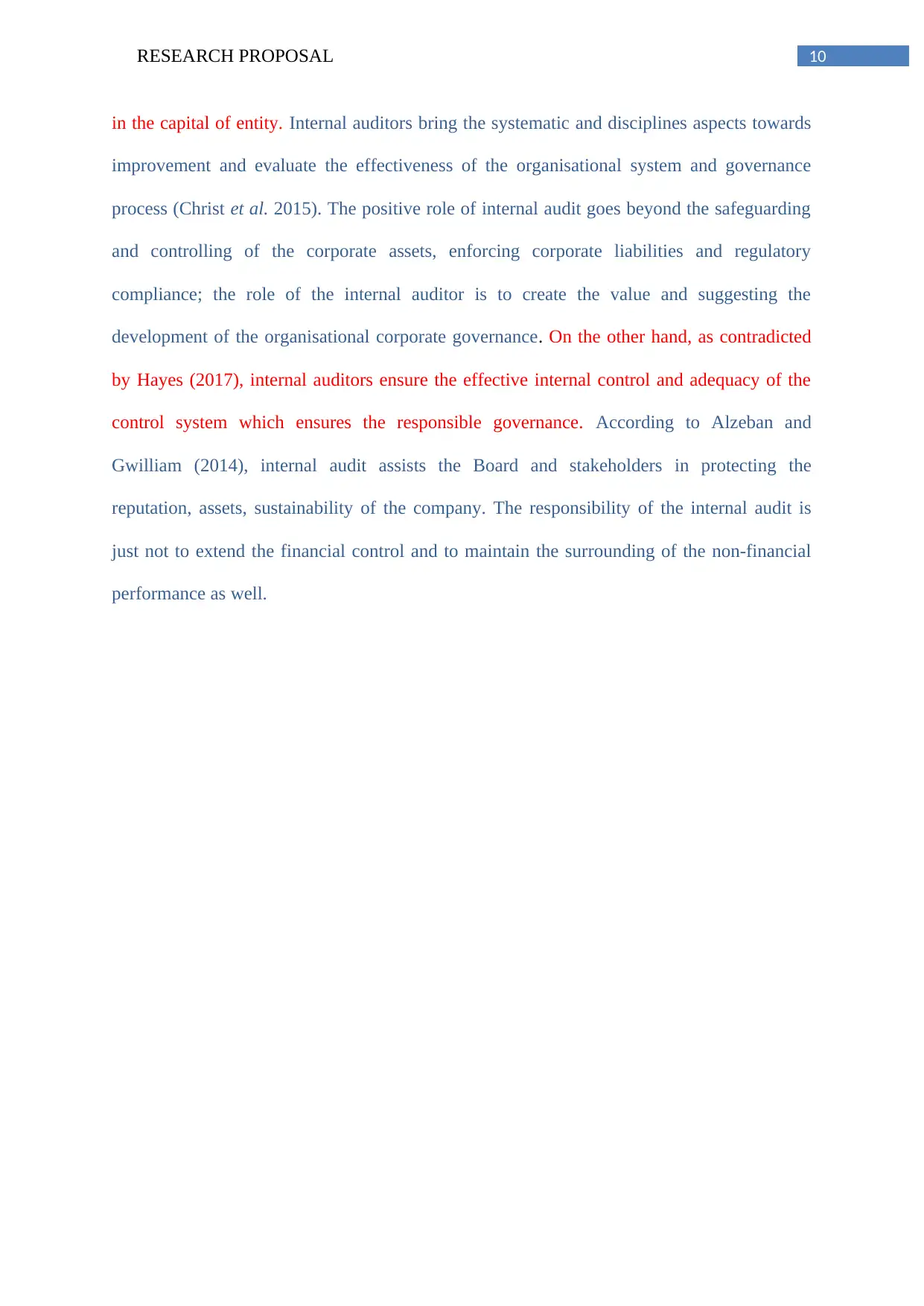
10RESEARCH PROPOSAL
in the capital of entity. Internal auditors bring the systematic and disciplines aspects towards
improvement and evaluate the effectiveness of the organisational system and governance
process (Christ et al. 2015). The positive role of internal audit goes beyond the safeguarding
and controlling of the corporate assets, enforcing corporate liabilities and regulatory
compliance; the role of the internal auditor is to create the value and suggesting the
development of the organisational corporate governance. On the other hand, as contradicted
by Hayes (2017), internal auditors ensure the effective internal control and adequacy of the
control system which ensures the responsible governance. According to Alzeban and
Gwilliam (2014), internal audit assists the Board and stakeholders in protecting the
reputation, assets, sustainability of the company. The responsibility of the internal audit is
just not to extend the financial control and to maintain the surrounding of the non-financial
performance as well.
in the capital of entity. Internal auditors bring the systematic and disciplines aspects towards
improvement and evaluate the effectiveness of the organisational system and governance
process (Christ et al. 2015). The positive role of internal audit goes beyond the safeguarding
and controlling of the corporate assets, enforcing corporate liabilities and regulatory
compliance; the role of the internal auditor is to create the value and suggesting the
development of the organisational corporate governance. On the other hand, as contradicted
by Hayes (2017), internal auditors ensure the effective internal control and adequacy of the
control system which ensures the responsible governance. According to Alzeban and
Gwilliam (2014), internal audit assists the Board and stakeholders in protecting the
reputation, assets, sustainability of the company. The responsibility of the internal audit is
just not to extend the financial control and to maintain the surrounding of the non-financial
performance as well.
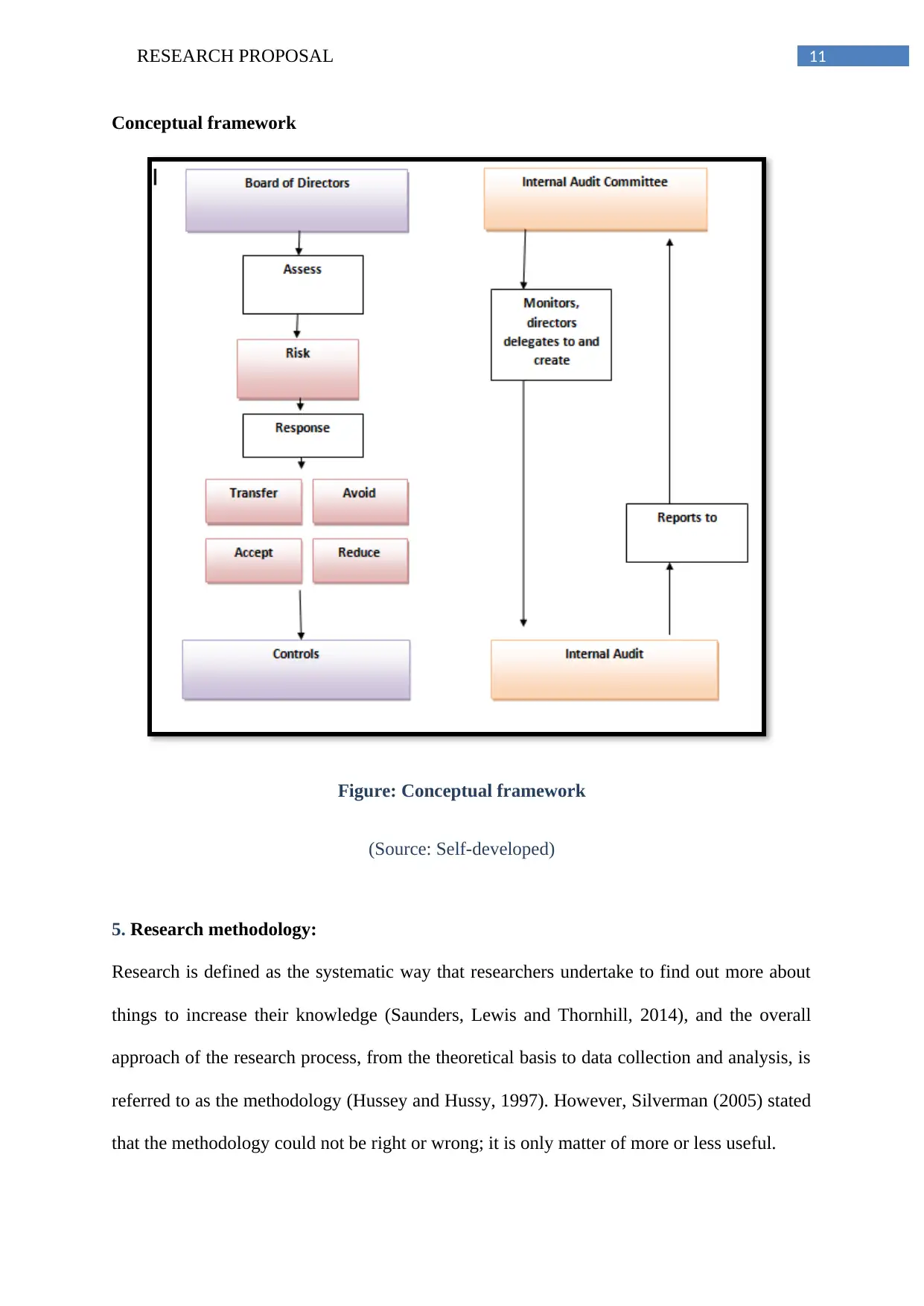
11RESEARCH PROPOSAL
Conceptual framework
Figure: Conceptual framework
(Source: Self-developed)
5. Research methodology:
Research is defined as the systematic way that researchers undertake to find out more about
things to increase their knowledge (Saunders, Lewis and Thornhill, 2014), and the overall
approach of the research process, from the theoretical basis to data collection and analysis, is
referred to as the methodology (Hussey and Hussy, 1997). However, Silverman (2005) stated
that the methodology could not be right or wrong; it is only matter of more or less useful.
Conceptual framework
Figure: Conceptual framework
(Source: Self-developed)
5. Research methodology:
Research is defined as the systematic way that researchers undertake to find out more about
things to increase their knowledge (Saunders, Lewis and Thornhill, 2014), and the overall
approach of the research process, from the theoretical basis to data collection and analysis, is
referred to as the methodology (Hussey and Hussy, 1997). However, Silverman (2005) stated
that the methodology could not be right or wrong; it is only matter of more or less useful.
⊘ This is a preview!⊘
Do you want full access?
Subscribe today to unlock all pages.

Trusted by 1+ million students worldwide
1 out of 23
Related Documents
Your All-in-One AI-Powered Toolkit for Academic Success.
+13062052269
info@desklib.com
Available 24*7 on WhatsApp / Email
![[object Object]](/_next/static/media/star-bottom.7253800d.svg)
Unlock your academic potential
Copyright © 2020–2025 A2Z Services. All Rights Reserved. Developed and managed by ZUCOL.





